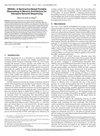GPU统一存储上张量迁移的内存超订阅感知调度
IF 1.4
3区 计算机科学
Q4 COMPUTER SCIENCE, HARDWARE & ARCHITECTURE
引用次数: 0
摘要
深度神经网络(DNN)训练需要大量的内存容量,超出了当前GPU板载内存的限制。用ssd扩展GPU内存是一种经济有效的方法。然而,ssd的低带宽给数据管理带来了严重的性能瓶颈,特别是对于基于统一虚拟内存(UVM)的系统。UVM中默认的按需迁移机制会导致频繁的页面错误和停滞,关键路径上的内存过度订阅和退出进程会加剧这种情况。为了解决这些挑战,本文提出了内存超订阅感知的张量迁移调度(MOST),这是一个旨在改善UVM环境中的数据迁移的软件框架。MOST配置内存访问行为,量化内存超额订阅的影响,并调度张量迁移,以最大限度地减少总体训练时间。根据分析结果,MOST在DNN内核代码中执行新设计的预提取和预取指令。MOST有效地选择和迁移张量,可以减轻内存超额订阅的摊位,从而减少训练时间。我们的评估表明,与最先进的技术DeepUM和G10相比,MOST的平均加速速度分别提高了22.9%和12.8%。本文章由计算机程序翻译,如有差异,请以英文原文为准。
MOST: Memory Oversubscription-Aware Scheduling for Tensor Migration on GPU Unified Storage
Deep Neural Network (DNN) training demands large memory capacities that exceed the limits of current GPU onboard memory. Expanding GPU memory with SSDs is a cost-effective approach. However, the low bandwidth of SSDs introduces severe performance bottlenecks in data management, particularly for Unified Virtual Memory (UVM)-based systems. The default on-demand migration mechanism in UVM causes frequent page faults and stalls, exacerbated by memory oversubscription and eviction processes along the critical path. To address these challenges, this paper proposes Memory Oversubscription-aware Scheduling for Tensor Migration (MOST), a software framework designed to improve data migration in UVM environments. MOST profiles memory access behavior and quantifies the impact of memory oversubscription stalls and schedules tensor migrations to minimize overall training time. With the profiling results, MOST executes newly designed pre-eviction and prefetching instructions within DNN kernel code. MOST effectively selects and migrates tensors that can mitigate memory oversubscription stalls, thus reducing training time. Our evaluation shows that MOST achieves an average speedup of 22.9% and 12.8% over state-of-the-art techniques, DeepUM and G10, respectively.
求助全文
通过发布文献求助,成功后即可免费获取论文全文。
去求助
来源期刊

IEEE Computer Architecture Letters
COMPUTER SCIENCE, HARDWARE & ARCHITECTURE-
CiteScore
4.60
自引率
4.30%
发文量
29
期刊介绍:
IEEE Computer Architecture Letters is a rigorously peer-reviewed forum for publishing early, high-impact results in the areas of uni- and multiprocessor computer systems, computer architecture, microarchitecture, workload characterization, performance evaluation and simulation techniques, and power-aware computing. Submissions are welcomed on any topic in computer architecture, especially but not limited to: microprocessor and multiprocessor systems, microarchitecture and ILP processors, workload characterization, performance evaluation and simulation techniques, compiler-hardware and operating system-hardware interactions, interconnect architectures, memory and cache systems, power and thermal issues at the architecture level, I/O architectures and techniques, independent validation of previously published results, analysis of unsuccessful techniques, domain-specific processor architectures (e.g., embedded, graphics, network, etc.), real-time and high-availability architectures, reconfigurable systems.
 求助内容:
求助内容: 应助结果提醒方式:
应助结果提醒方式:


